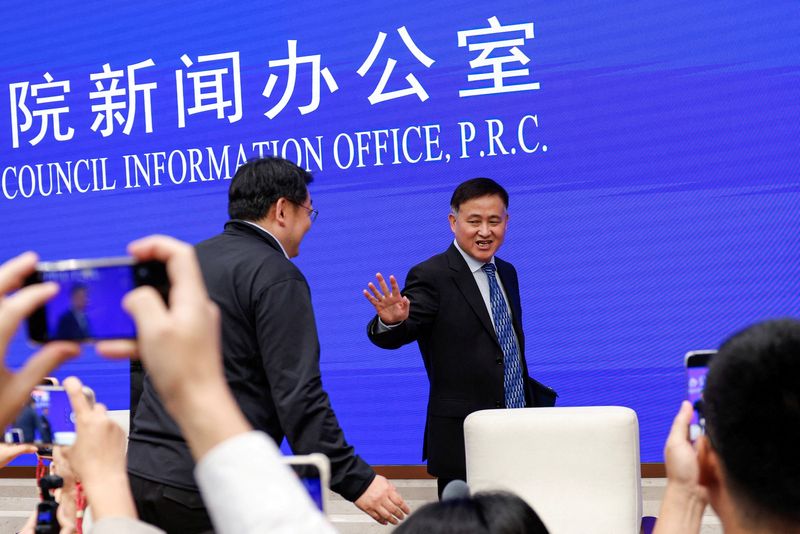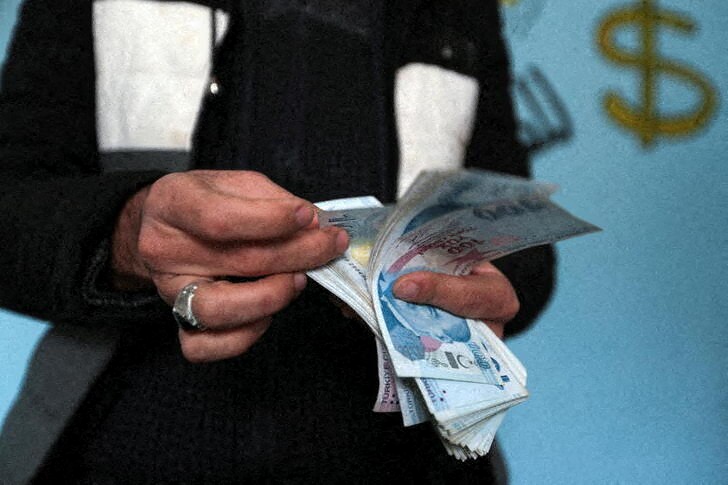By Liangping Gao, Ellen Zhang and Marius Zaharia
BEIJING/HONG KONG (Reuters) – China’s central bank has shifted to a more aggressive easing stance, but its policy weapons don’t have the key enemy to economic growth in their line of sight: the persistently weak consumer demand.
The liquidity injections and the lower borrowing costs flagged by the People’s Bank of China on Tuesday have lifted market sentiment, but mainly because they raised expectations authorities will follow soon with a fiscal package to complement the monetary and financial measures.
The world’s second-largest economy faces strong deflationary pressures and risks missing this year’s roughly 5% growth target due to a sharp property downturn and frail consumer confidence, which analysts say only fiscal policies that put money into consumer pockets through higher pensions and other social benefits can address.
“The central bank policies exceeded expectations, but the main problem in the economy today is not the lack of liquidity,” said Shuang Ding, chief economist for Greater China and North Asia at Standard Chartered (OTC:).
“In terms of helping the real economy, I think there will be another policy package, especially fiscal policies.”
HSBC chief Asia economist Fred Neumann concurred, saying authorities must boost demand which could be “done through other policy measures like fiscal policy.”
While the PBOC is unleashing its boldest set of measures since the pandemic, the total size of the stimulus remains small and analysts doubt its overall effectiveness.
Given weak credit demand from households and businesses, the 1 trillion yuan ($142 billion) that would be released into the financial system through a cut in bank reserve requirements may spur more sovereign bond buying than real economy lending.
Firms “have been unwilling for years to borrow no matter what credit conditions are because corporate sentiment is so poor,” China Beige Book said in a note.
“And households are not going to respond to worse returns on savings by becoming suddenly more optimistic.”
Cuts in the existing mortgage rates will release an extra 150 billion yuan annually to households. But that’s equivalent to only 0.12% of annual economic output, and some of it may be saved for early mortgage repayments.
Chinese consumers spend just 35 yuan of any extra 100 yuan they receive, estimates Raymond Yeung, chief Greater China economist at ANZ.
The key interest rate cut by 20 basis points is larger than usual, but smaller than what most central banks typically do. The U.S. Federal Reserve cut rates by 50 bps last week.
“Each of the main monetary-policy measures announced by the PBOC has already been used in the past, and had minimal economic impact before,” Gavekal Dragonomics analysts said in a note, describing the scale of the package as “modest.”
“The significance of this package is thus mostly in whether it opens the door to other moves.”
MORE STIMULUS?
By injecting liquidity, the PBOC provides more room for the government to issue debt for any extra stimulus, Neumann said.
“What the market is hoping for is that the liquidity injections signal a potential announcement in the coming weeks for a big bond issuance programme,” he added.
Lynn Song, chief economist for greater China at ING, says the most direct way to stimulate the economy in the short-term is through more government investment, although “economists are increasingly in favour of demand-side support, which could come in the form of consumption vouchers or similar policies.”
The well-trodden path is investment. In October last year, to ensure meeting the 2023 growth target, Beijing announced an extra 1 trillion yuan in special treasury bonds to fund various infrastructure projects.
It’s unclear how different any additional stimulus this year would be.
Officials in July flagged a marginal shift in spending towards consumers by subsidising purchases of new appliances and other goods. This was seen a small step in the direction many economists have for years called on Beijing to take to address its wide investment-consumption imbalance.
The share of household consumption in annual economic output is roughly 20 percentage points below the global average, while the share of investment – government-driven, debt-fuelled and yielding dwindling returns – is 20 points above.
This could be addressed through transfers from the state sector to consumers.
Nomura analysts said in a note on the PBOC package that Beijing could raise pensions and medical benefits for low-income groups and subsidise child birth to make some progress in rebalancing its economy.
But they warn such steps may not be imminent.
“We do not believe these monetary and financial policies alone are enough to arrest the worsening economic slowdown,” they said.

“We believe fiscal stimulus should take the front seat, although we encourage investors to manage their expectations.”
($1=7.0331 renminbi)
Note: This article have been indexed to our site. We do not claim legitimacy, ownership or copyright of any of the content above. To see the article at original source Click Here













